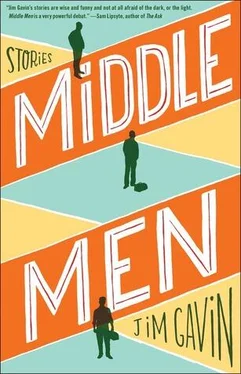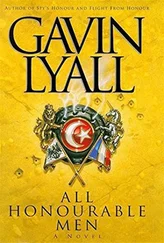“I’m sorry,” she said. “I didn’t hear you.”
“Where’s Maria?”
“Maria’s asleep.”
“Are you a nurse or something?”
“No,” she said. “I’m nobody.”
I didn’t know how to respond to this statement. She didn’t say it offhand; she seemed to mean it. In Los Angeles this was a rare thing to confess.
“I’m just sort of here at the moment,” she said, opening the front door.
“Do you know Maria?”
“She wants to sell her piano,” she said. “I saw her ad in the PennySaver . That’s why I’m here.”
“You’re buying her piano?”
I sounded skeptical. It was a beautiful old piano and this woman wore old navy-blue corduroys and a ragged white T-shirt. She was tall and athletic-looking, with broad shoulders and long bony fingers. Sweat dripped off the end of her nose and I could tell she wasn’t wearing deodorant.
“No. It’s an old Bösendorfer. I just wanted a chance to play it. That’s all.”
“I thought that was a record.”
“You’ve got a bad ear,” she said. “Maria’s nuts. She said I could come by whenever I want to play.”
I held up a disposable tin container full of meat loaf and macaroni. “Can you give her this when she wakes up?”
“Sure.”
Footsteps echoed in the tiled hallway. Maria came into the vestibule, leaning on a cane. Because she couldn’t walk up the stairs anymore, she now slept in one of the smaller first-floor bedrooms, on a single.
“You stopped. Why did you stop?” Maria saw me at the door. “Brian, come in! Have you met Karen?”
We shook hands. Her long bony fingers were rough with calluses.
“She plays the piano,” said Maria.
Maria kept the curtains closed, even in July, and it was dark and stuffy inside. I followed her through the living room. Everything was covered in dust. On one wall there was a framed black-and-white photograph of Maria Recoba and her late husband, Gabriel. The photo, taken fifty years ago in Buenos Aires, captured the aristocratic bearing that was still noticeable in Maria, even when she was slicing her meat loaf with a plastic knife and watching game shows. She told me the first day I met her that she wanted to hurry up and die so she could be with Gabriel again. They didn’t have any children. She wore the same dress every time I saw her. She was haunting her own house.
“Why are you selling your piano?” I asked her.
“For the money.” She pointed to one of those tasseled Victorian lamps that look like a jellyfish. “I’m selling that too. I’m selling everything. I’m making a donation to Blessed Sacrament and then I’m going to die.”
“Are you selling the house?” I asked.
“I plan to die in this house,” she said, turning for the kitchen. “Let’s have lunch.”
“I should get going,” said Karen.
“No,” said Maria.
There was nothing to eat but the meal I delivered and some apples that a neighbor had picked out of Maria’s backyard. She ate all her meals at a little portable table in the kitchen. The dining room table, an ornately carved slab of oak, was buried under piles of laundry. We divided up the macaroni and meat loaf and drank tap water. Karen took an apple in her hands and snapped it cleanly in half. I had never seen anyone do that before. I was amazed. I wanted to open the curtains so I could see her face.
“I don’t know anything about classical music,” I said.
“I can only play a few things,” said Karen. “I’m not some classical freak.”
“Someone eat my spinach,” said Maria.
“We should open the windows,” I said.
She started to say something, but choked a little on her meat loaf. She held up her hand to indicate that she wasn’t going to die at this particular moment. “Go play something, Karen.”
“I should go home.”
“Where do you live?” I asked.
“Play something,” said Maria. “Just for a little while.”
We followed her back into the living room and Karen sat down obediently on the dusty bench. She turned a page in the book and took a deep breath. She never stopped or made a mistake. It was such hard work playing the piano. I had no idea it was such hard work. Maria sat down on a couch and fell asleep almost immediately. Karen came to the end of a section; her head dropped, like she had just been given terrible news, and then, slowly, she lifted her hands off the keys. She turned and seemed surprised that anyone else was in the room.
“That was great,” I said, and for some reason it sounded cloying and false, like I had already made up my mind to compliment her before she had played a single note.
“Is Maria always alone here?” she said, looking at the shriveled little woman snoring on the couch.
“Health aides come by a couple times a week to make sure she’s not pissing herself. And she has friends from church.”
“It’s sad.”
“She has it better than most. A lot of them end up in ratty hotels downtown.”
She finally looked at me. “It’s nice of you to come by.”
“I get paid.”
She got up from the piano. “I should go while I have the chance.”
I felt bad just leaving Maria on the couch, but I didn’t want to be there either. When the front door opened, she sleepily called out, “Tomorrow, Karen.”
“Okay,” she said, but I couldn’t tell if she meant it.
I followed Karen down the walk. Her blue corduroys were so worn it looked like she had sat in powder. She said goodbye and started down the hill.
“Do you live nearby?” I asked.
“Eagle Rock,” she said. “I took the bus.”
I stood next to my delivery van and we looked at each other for a moment, and then a moment too long, and she kept walking.
I got in the van and played with the radio. Then I studied my delivery list, even though I knew it by heart. I could see her walking down the hill. She didn’t carry a purse. She took long bounding strides and didn’t seem to notice the view. It was hot and hazy and the buildings downtown were a ghostly outline. I wanted her to disappear around a corner, so it would be too late. I’d have an excuse for not doing what I wanted. And this is what I wanted: to offer her a ride and spend more time with her and then fuck her and marry her and listen to her play piano. I was twenty-three years old. I waited and she finally turned the corner. I felt sick. A few minutes later, as I drove down Vermont, I saw her at a bus stop, cracking her knuckles.
• • •
“Go back tomorrow,” advised Javier, eating cereal from a Bundt cake bowl that had been left behind by the castle’s previous tenants. The kitchen was small and toxic, but all meaningful conversations took place here. Gilbert, shorter and less effusive than his older brother, leaned against the counter, nodding solemnly. It was midnight and we were listening to “Blues Hotel” on KXLU. For the last hour we had been trying to snap apples in half. None of us were strong enough to do it.
“I had my chance,” I said. “Now it would just be weird.”
“Everything’s always weird,” Javier said, his chubby face serene in the twitching fluorescent light.
“She plays the piano like she’s digging a ditch.”
“Go back tomorrow.”
“She has scratches all over her arms.”
“She probably has cats,” said Javier, with a dark note of apprehension.
Nathan was sitting on the couch with my dulcimer and with a new girl whom he hadn’t bothered to introduce. He never introduced us to the girls he brought around the castle; it was some insidious form of musician etiquette. He was growing out his sandy blond hair, shaggy on top and triggers on the side. Mod was back, again.
“Is she pretty?” he asked.
“Not as pretty as you,” I said.
Читать дальше












